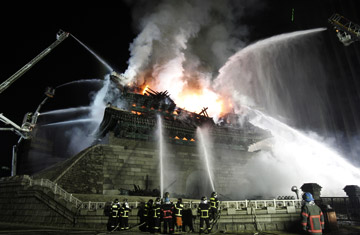This story is certainly going to pump new life into the Boycott the 2008 Olympics movement. The Chinese were full of pride that Spielberg was going to help choreograph the much anticipated Opening Ceremony on August 8, and that pride will be tranformed into resentment and indignation very soon. (It appears, by the way, that nearly every link to the topic on Google News activates the dreaded “Server not Found” window.)
The question of a boycott is a difficult issue that brings out a lot of raw emotion on both sides. The Chinese government is often unjust, unfair, deceptive, inhumane and oppressive beyond words. Should it be punished by an international boycott of the Olympics? Should advocacy groups be using the Games to press their causes? Who would such a boycott serve? How accountable should China be for the behavior of its allies? You can find lots of ammunition to call for a boycott, but to what end?
In the shadow of the $440-million “bird’s nest” Olympic stadium, migrant workers toil for a few dollars a day. A few miles away, bulldozers destroy a neighborhood where petitioners gather to seek justice from the government. Farther afield, foreign journalists endure sporadic harassment despite promised press freedoms, with Chinese reporters, bloggers and activists facing far greater restrictions.
As Beijing prepares for the 2008 Summer Olympics in August, planners hope the outside world sees the glam architecture and ignores the poverty and social tension in the shadows.
“The Chinese way to say it is, we’re looking for ‘big face’ from the Games,” said Liu Junning, an analyst with the Chinese Cultural Studies Institute in Beijing.
New concerns emerged Tuesday when film director Steven Spielberg announced his withdrawal as artistic advisor for the Games over China’s support for the Sudanese government despite ongoing violence in the Darfur region.
The public relations blow came as eight Nobel Prize winners, 119 U.S. lawmakers and several entertainers signed a letter urging Chinese leaders to use their “significant influence” with the African nation to halt the genocide.
China doesn’t have a monopoly on attracting the anger of activists or on attempting to put its best foot forward. But the enormous gap in this restless country between wealthy 21st century cities and benighted 19th century rural areas, between egalitarian rhetoric and the reality of today’s cutthroat capitalism, raises the stakes.
Beijing is working much harder to airbrush out the negatives than previous Olympic hosts, reflecting in part a regime accustomed to controlling its media and critics.
China has courted, as I’ve said many times here, the murdering scum of the earth. Its engineer-leaders see the nation’s foreign policy in mathematical terms; the grid shows them where the resources are, what they have to pay to get them, and what their return on investment will be. The grid does not factor in human suffering, genocide or crimes against humanity. The question is, should the Olympics be used as a mechanism for punishing China for its sleeping with butchers?
A hard question. If someone asked me in 1935 if I would recommend boycotting the Games of 1936 I’d have a hard time answering. In 1936 we still did not know what history had in store for us, no matter how loathsome Hitler was. Maybe we’d have thought the Olympics would have a healing effect, injecting some badly needed sanity into a deranged Nazi Germany. (Of course, it didn’t turn out that way.) Had the Games been scheduled for 1938, however, and I were asked the same question after Kristallnacht I would have been the first to insist on a complete boycott. The German government was an accomplice to premeditated murder.
I am not comparing the policies of the CCP to the Nazis; if I could do that, I would be calling for a boycott. Rather, I’m trying to deal with the question, when is a boycott called for? In my opinion, the Soviet invasion of Afghanistan did not make the grade, and America’s invasion of Iraq doesn’t either – i.e., these oppressive and stupid acts merit condemnation but not across the board boycotts, even of sporting events, that punish the entire nation. We can list the iniquities of modern-day China and find a lot of grounds for outrage. But do we make them grounds for boycotting the Olympics?
As I argued in another thread, it isn’t that hard to find horror stories about the US under Bush, and of many other nations. (And no, I am not saying the US is as bad as China.) Should all these nations be boycotted? Should the Olympic Games be seen as a bargaining chip for advocacy groups? Should other nations shun America for the policies of our dim-witted president, and should our athletes be punished for it the way they were under Carter? Would the US boycott of the Beijing Olympics serve as a healthy precedent?
As I write about this, I have to admit I have mixed feelings. China has made a pact with the devil, pumping money into a regime that promotes genocide and then putting up pictures all over town of giraffes and elephants celebrating China’s harmonious and joyful partnership with Africa. But pacts with the devil are nothing new. What are our criteria for demanding an international boycott of any event in any country? Would we feel so comfortable with those criteria to have them imposed on our own country, whatever that may be?
Bottom line for me at this moment: China’s relationship with the government of Sudan is not sufficient grounds for a boycott. I think it would create many more problems than it would solve, and it would certainly do little for those suffering in Darfur.
As a disclaimer, I work with more than one company here that has a stake in the 2008 Olympics. I try not to let that affect my perception of what’s happening here in China. In fact, my work has only caused me to be more critical than ever of the incompetencies and stupidities of the Chinese bureaucracy. And no, I do not in any way, shape or form answer to anyone involved in the government here, despite harebrained reports that I am on the CCP payroll. That is utter nonsense.
Apologies in advance for not taking a super-hard stance either way on this question. This post is more about questions than answers.



Comments